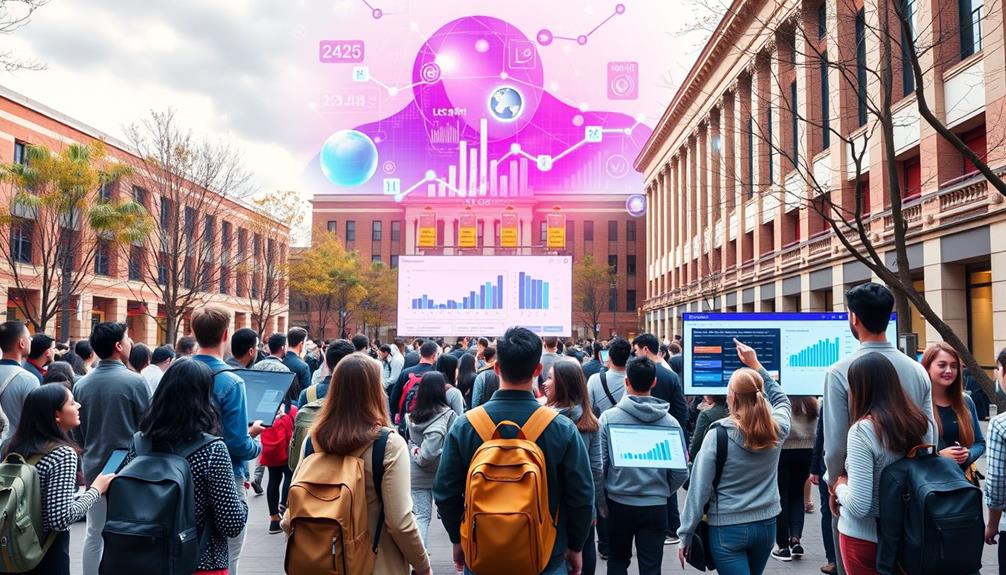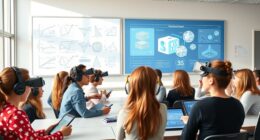The future of AI in smart cities is bright, especially for education and business. You'll see personalized learning experiences tailored to students' needs, enhancing engagement and reducing drop-out rates. On the business front, AI optimizes operations, boosting productivity and ensuring cost savings. Predictive analytics will help both sectors forecast challenges and adapt quickly. Furthermore, collaboration between educational institutions and businesses will shape curricula that meet future job market demands. As smart cities evolve, their impact on daily life becomes more profound. Stick around to explore how these advancements will reshape urban living and economic growth.
Key Takeaways
- AI will enhance personalized learning experiences in smart cities, aligning educational content with future job market skills.
- Businesses can leverage AI for operational optimization, significantly reducing costs and improving productivity in urban environments.
- Predictive analytics will identify at-risk students and improve educational outcomes, fostering a more skilled workforce for smart cities.
- AI-driven intelligent marketing strategies will help businesses engage customers more effectively, boosting sales and enhancing local economies.
- Real-time data utilization in smart cities will improve public services and citizen engagement, benefiting both education and business sectors.
Overview of Smart Cities
In a rapidly urbanizing world, smart cities are emerging as innovative solutions to tackle the challenges of city living. As you navigate these bustling environments, you'll notice how AI integration and technologies like IoT and machine learning enhance urban experiences.
With an estimated 68% of the global population projected to live in cities by 2050, addressing urban challenges such as overcrowding and resource allocation becomes essential. The incorporation of AI security solutions guarantees that these technologies operate safely, protecting your personal data and enhancing the overall safety within these urban spaces.
Smart cities focus on sustainability, aiming to minimize their environmental impact while enhancing your quality of life. You'll find improved transportation systems that utilize real-time data to optimize traffic flow and reduce congestion.
Digital services make everyday tasks more convenient, from smart waste management to energy-efficient buildings.
Smart governance plays a key role, using digital technologies to foster transparency and encourage citizen engagement in urban planning. This approach not only streamlines administrative processes but also empowers you to participate actively in shaping your community.
As smart cities evolve, they promise to create more livable, efficient spaces that meet the needs of their residents while addressing the complexities of modern urban life.
Role of AI in Education

Frequently, AI plays a transformative role in education by personalizing learning experiences for students. With AI, you're no longer confined to a one-size-fits-all approach. Instead, educational content is tailored to meet individual needs and learning styles. Here's how AI enhances education:
| Feature | Benefits | Examples |
|---|---|---|
| Personalized Learning | Tailored content for individual needs | Adaptive learning platforms |
| Predictive Analytics | Early identification of at-risk students | Data-driven intervention strategies |
| Administrative Tools | Streamlined processes for teachers | Automated grading and enrollment systems |
Moreover, AI-driven predictive analytics can identify students at risk of falling behind, allowing timely interventions to boost academic outcomes. Administrative tools simplify tasks like grading, freeing educators to focus more on student engagement. The integration of AI in curriculum design guarantees students develop skills aligned with future job markets. Finally, AI technologies enhance remote learning by creating immersive experiences, making quality education accessible to everyone. By leveraging AI, you're investing in a more effective, engaging, and inclusive educational landscape.
AI Applications in Business

In smart cities, you can leverage AI-driven business optimization to streamline operations and cut costs considerably.
The integration of AI in business not only enhances operational efficiency but also fosters stronger relationships with customers through personalized experiences.
By utilizing smart supply chain management tools, your business can enhance efficiency and respond swiftly to market changes.
Additionally, intelligent marketing strategies powered by AI can help you engage customers more effectively and boost your conversion rates, as seen in effective use of social proof.
AI-Driven Business Optimization
AI-driven business optimization is transforming how companies operate within smart cities, enhancing efficiency and reducing costs. With AI adoption becoming increasingly prevalent, businesses leverage digital infrastructure and data analytics to streamline operations. Intelligent automation, powered by machine learning, has led 61% of companies to adopt generative AI, boosting productivity and making data more useful.
Here's a quick overview of key benefits from AI-driven business optimization:
| Benefit | Impact | Percentage Improvement |
|---|---|---|
| Cost Reduction | Optimized supply chain management | Up to 30% |
| Increased Productivity | Enhanced resource allocation | 15-25% |
| Improved Marketing | Tailored strategies via CRM | Up to 20% in conversion rates |
| Real-Time Decision Making | Swift response to market changes | Enhanced agility and competitiveness |
Smart Supply Chain Management
Smart supply chain management is revolutionizing how businesses operate, making processes more agile and efficient. With AI applications, you can enhance efficiency by utilizing predictive analytics to forecast demand and optimize inventory levels, potentially reducing operational costs by up to 20%.
Additionally, the integration of AI-driven solutions can improve data protection for businesses, addressing concerns around AI's rapid growth in the marketplace. Integrating automation tools, like robotic process automation (RPA), streamlines logistics and reduces human error, improving order fulfillment speeds by over 30%.
Smart supply chains leverage IoT sensors for real-time tracking of goods, offering transparent visibility and enabling you to make proactive decisions that mitigate disruptions. This capability can boost delivery accuracy by up to 95%.
In addition, machine learning algorithms analyze vast data sets to identify patterns and trends, allowing your business to adapt swiftly to market changes and improve overall supply chain resilience.
AI-powered analytics tools also enhance supplier relationship management by evaluating performance through detailed data analysis. This leads to better negotiation outcomes and cost savings of 10-15% on procurement.
Intelligent Marketing Strategies
Harnessing the power of intelligent marketing strategies can greatly elevate your business's reach and effectiveness. By leveraging AI applications, you can analyze vast datasets to personalize customer experiences, leading to a remarkable 20% boost in engagement and conversion rates. This is particularly important in today's landscape, where AI ethicists shape guidelines to guarantee ethical marketing practices.
Predictive analytics allows you to forecast market trends and consumer behavior, making your marketing campaigns more accurate and potentially reducing advertising costs by 15%.
Natural Language Processing (NLP) tools enhance customer interactions, enabling chatbots and virtual assistants to provide 24/7 support, improving response times by over 50%. This means your customers get immediate assistance, enhancing their overall experience with your brand.
Moreover, machine learning algorithms can optimize real-time pricing strategies by analyzing competitor actions and demand fluctuations. This optimization could increase your sales revenue by 10-30%.
Plus, AI applications can automate content creation and distribution, allowing you to scale your marketing efforts efficiently, reducing time spent on manual tasks by up to 70%.
Incorporating these intelligent marketing strategies not only streamlines your operations but also positions your business to thrive in the dynamic landscape of smart cities.
Benefits of AI Integration

Integrating AI into urban infrastructures brings numerous benefits that transform how cities operate. In smart cities, AI integration enhances operational efficiency across various sectors, including transportation, healthcare, and energy, leading to improved service delivery and resource management.
For example, similar to how converting retirement savings into gold assets can protect against market fluctuations, AI can provide a diversification of services that mitigates risks associated with urban management. With predictive analytics, you can increase public safety by up to 30% through real-time data monitoring and timely interventions.
Moreover, AI applications in smart governance boost citizen engagement, resulting in a 15% increase in public participation in decision-making processes. You'll notice significant economic benefits as well, with estimates suggesting a potential 20% increase in productivity in smart city services due to automation and enhanced data utilization.
Additionally, AI plays an essential role in promoting sustainable development. By optimizing waste management and reducing energy consumption, it contributes to a remarkable 25% decrease in urban carbon footprints through efficient resource allocation.
These advancements not only make your city smarter but also create a more livable environment. Overall, the integration of AI in smart cities is a significant step toward building safer, more efficient, and sustainable urban spaces for everyone.
Challenges and Risks Ahead

Maneuvering the complexities of AI deployment in urban environments presents significant challenges and risks that must be addressed. One of the primary challenges associated with artificial intelligence in smart cities is the ethical considerations surrounding its use. You need to guarantee responsible decision-making to avoid potential biases that could negatively impact community members.
Additionally, the digital divide poses a risk of alienating marginalized populations who may lack access to these technologies, which is vital for equitable development. Moreover, continuous education on cybersecurity threats is essential to protect against vulnerabilities that arise from AI integration.
Privacy and security concerns loom large, as the reliance on extensive datasets makes smart cities vulnerable to cyberattacks and breaches. With a limited understanding of AI technologies among city officials, effective decision-making can become hindered, severely impacting the integration of AI solutions into urban governance.
In addition, financial constraints often restrict the feasibility of implementing and maintaining AI infrastructure. You must recognize that these factors can impede the overall advancement of smart city initiatives.
The impact of AI will depend on addressing these challenges proactively, guaranteeing that smart cities can thrive while being inclusive, secure, and ethically sound.
Future Trends in Smart Cities

As you look toward the future of smart cities, you'll notice that technological advancements will play a key role in shaping urban environments.
Diverse flying environments enhance pilot training and experience, showcasing how collaborative efforts can lead to innovative solutions that tackle urban challenges head-on.
Collaborations between public and private sectors are likely to foster innovative solutions that tackle urban challenges head-on.
Technological Advancements Ahead
In the evolving landscape of smart cities, emerging technologies like AI and IoT are set to transform urban living dramatically. These advancements will play foundational roles in smart city initiatives, enhancing public services and addressing urban challenges with greater efficiency.
You'll notice a significant focus on resilience and adaptability to climate change, as smart cities utilize real-time data for improved sustainability and environmental management. Additionally, harnessing renewable energy sources such as geothermal energy generation can contribute to the overall energy efficiency of urban environments.
As you engage with these digital societies, expect economic transformation driven by collaboration between public and private sectors. This partnership will foster innovation, leading to more responsive urban services that cater to citizens' needs.
Predictive analytics and accelerated computing will be at the forefront, enabling better urban planning and decision-making processes, which ultimately enhance productivity and resource allocation.
The continuous evolution of AI technology will reshape urban environments, necessitating ongoing adaptation of infrastructure and services. By leveraging actionable insights, smart cities won't only meet current demands but also prepare for future challenges.
Embrace these technological advancements, as they promise to create a more connected, sustainable, and efficient urban experience for everyone involved.
Collaborative Urban Solutions
Amid the rapid evolution of smart cities, collaborative urban solutions are emerging as an essential trend that enhances the way cities function and engage with their residents. By leveraging AI and IoT technologies, these solutions improve transportation efficiency and promote sustainable urban living.
In addition, integrating energy-efficient technologies, such as heat pump innovations, can considerably reduce a city's carbon footprint while enhancing overall sustainability.
Here are three key aspects of collaborative urban solutions:
- Community Engagement: Smart city initiatives prioritize citizen participation in decision-making processes through digital platforms. This fosters transparency and a sense of ownership among residents.
- Public-Private Partnerships: Collaborations between public and private sectors drive innovation. For instance, Singapore's Smart Nation program partners with tech companies to implement AI in smart cities, enhancing urban living and infrastructure resilience.
- Predictive Analytics in Urban Planning: Future trends show a shift toward using predictive analytics to forecast and mitigate the impacts of climate change. This guarantees that urban planning adapts to dynamic challenges.
As you explore collaborative urban solutions, you'll see how they transform urban environments and emphasize collective responsibility, ultimately leading to smarter, more efficient cities.
Collaboration for Sustainable Growth

Fostering collaboration among educational institutions, businesses, and government entities is essential for sustainable growth in AI-driven smart cities. By working together, you can equip the workforce with necessary skills, as 61% of workers are already using or planning to use generative AI in their roles.
This partnership can also enhance smart city initiatives, integrating AI and IoT technologies to improve public services. For instance, predictive analytics can greatly boost urban planning and resource allocation, making cities more efficient. Additionally, as seen in evaluating investment suitability, understanding the landscape of emerging technologies is important for informed decision-making.
Moreover, educational programs centered on AI literacy can bridge the digital divide, ensuring that underprivileged communities gain access to valuable opportunities. Multi-sector collaborations are critical for developing sustainable strategies that leverage AI to tackle urban challenges.
By collaborating, you can create innovative solutions that increase productivity—research shows a potential 30% increase in code creation through AI applications in smart cities.
Ultimately, collaboration fosters an environment where businesses can optimize their operations while improving the quality of life for residents. Emphasizing these partnerships will lead to a more sustainable future for everyone involved in the smart city ecosystem.
Frequently Asked Questions
What Is the Impact of AI on the Future of Education?
AI's impact on education transforms learning. You'll experience personalized content, reduced administrative tasks, and improved student performance. Embracing AI tools enhances remote learning, creating new opportunities and jobs in the evolving educational landscape.
How the Future of AI Will Impact Business?
AI's revolutionizing business by boosting productivity and efficiency. You'll see improved decision-making through data analytics and personalized services, allowing you to focus on strategic goals while automating routine tasks and enhancing customer engagement.
How Will AI Impact Smart Cities?
Imagine maneuvering a bustling city where traffic flows smoothly, healthcare thrives, and waste vanishes. AI's integration transforms urban life, enhancing efficiency, sustainability, and citizen engagement, making your daily experiences richer and more enjoyable.
What Is the Future of Smart Cities?
The future of smart cities involves integrating advanced technologies to enhance urban living. You'll experience improved transportation, energy efficiency, and public services, fostering sustainability and innovation. Collaboration will drive progress, making cities more livable and resilient.
Conclusion
As we look toward the future, it's easy to worry about AI taking jobs or making decisions without human touch. But remember, AI isn't here to replace us; it's here to enhance our capabilities and create smarter, more connected communities. By embracing AI in education and business, we're paving the way for innovative solutions that tackle real-world challenges. Let's work together to harness this technology, ensuring it serves humanity, not just technology itself. The future is bright!











